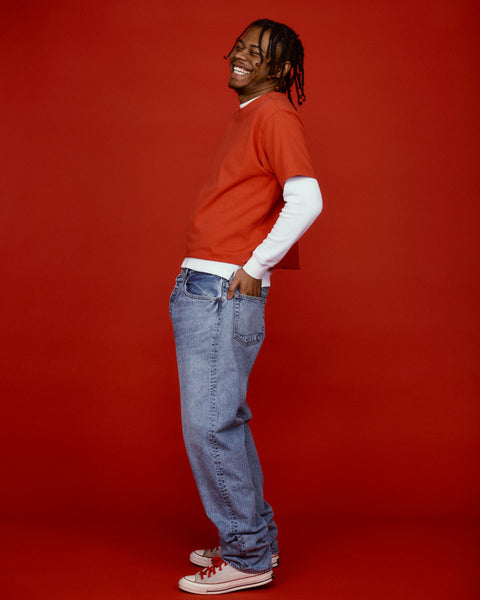Fri, Apr 12, 24
To celebrate our collaboration with our friends at OrSlow, we had a chat with OrSlow's founder, Ikiro Nakatsu on his search for the right formula for this exclusive '4 Year Wash' and the Art of Denim.
After a lengthy search for that particular denim fade Ichiro, found the right formula for this exclusive '4 Year Wash'. Together, we've recreated that untraceable vintage jean you would never come across in a million years—one that evokes the 90s-style denim you've been searching for since your high school years.
Read more about it below. 
In this industry where fashion innovation is always sought after and fashion trends constantly change, what is your reason for continuing to focus on denim production?
First of all it's because I personally love denim. As an industrial product born in the 1800s, denim has continuously evolved. I'm interested in its evolution, and one interesting aspect of denim is how its details vary depending on the era in which it was made. From denim in the 1800s to denim in the 1990s, those eras of denim interest me. Originally sewn with a single-needle sewing machine, denim production evolved gradually until the 1990s. Denim production has evolved to be more efficient and mass-producible in sewing and spinning, dyeing, and weaving."
The fashion business is ever-evolving. What significant changes are happening? Also, how is OrSlow adapting to these changes while maintaining its essence?
"Due to factors like the pandemic, wars, and the yen depreciation, raw materials such as cotton and dyes imported to Japan have skyrocketed in price, leading to a continuous rise in denim fabric prices recently. While material costs have risen, fortunately, since we produce in Japan, we've maintained prices by balancing the inflation of raw materials and the depreciation of the yen when exporting abroad. However, we must think about how to address this in the future. Nevertheless, the product's design, comfort, and quality are the most important."
OrSlow seems to have a strong commitment to creating timeless fits like the 105 and 107. Could you elaborate on why these remain the pinnacle of superior denim and how they continue to withstand evolving fashion preferences?
"Our classic 105 and 107 selvedge denim fits are based on analysing jeans from the early 1960s, creating originals from materials, and planning details such as fabric, silhouette, and sewing specifications based on a detailed analysis of jeans from the 1960s. These two model numbers with selvedge edges are models created based on vintage jeans from the early 1960s. We continuously analyse vintage jeans to get closer to them through minor changes. We continue to focus on jeans from that era because I've seen various jeans over the years, and jeans from the 1950s to the 1960s felt the most beautiful in terms of fabric, silhouette, fading, design, and everything else. Basic jeans from the 1960s to the 1990s are truly standard, worn by various designers and artists during periods when American casual wear or mod styling was popular."

The upcoming 4 Year Wash custom jeans are highly anticipated. Could you tell us about the characteristics of these jeans, including the fabric selection and the processing methods used to achieve the unique wash?
"The 4 Year Wash model is inspired by basic jeans from the late 1980s to the 1990s. During this era, the weaving machines had evolved, resulting in no selvedge on the side seams, which is a characteristic detail of jeans from this time. Additionally, the fabric from this era has fewer irregularities in the yarn and less texture due to changes in spinning and weaving techniques.
This 4 YEAR WASH also uses fabric analyzed from jeans from the 1990s, and the sewing specifications, fading, and silhouette were carefully planned based on OrSlow's classic model 105W, with special processing added. It was produced in collaboration with the production facility while discussing samples of vintage jeans from the 1990s that had been worn for about four years."
Your approach to production, focusing on almost made-to-order and limited production quantities, is commendable. How does this philosophy resonate with OrSlow's vision? What advantages does it offer in the current fashion industry?
"I've been involved in denim work for over 25 years, but before launching OrSlow, I worked for a major denim manufacturer in Japan. Back then, fast fashion was not as widespread as it is today, but the production volume of jeans was already incredibly high.
Later, due to the momentum of fast fashion, the jeans produced in large quantities mostly became excess inventory, and I remember having large amounts of stock in warehouses. It would be ideal to produce only what is needed. It's challenging to achieve, but I believe this is what everyone in the fashion industry, whether producers or sellers, thinks. The idea is to minimize waste and consider the environment without using resources unnecessarily. When denim was born in the 1800s, I think people treated things with more care. Returning to that mindset in today's world of excessive materialism is challenging, but I want to continue making things with care and affection."

Get your hands on the exclusive Tenue de Nîmes x OrSlow '105 4 Year Wash' jeans, a limited edition gem that's just a click or a step away. Find them online or come say hi at our store at Elansgracht 60 - but hurry, they won’t stick around for long!